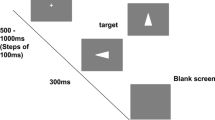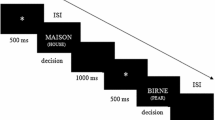Abstract
Several studies have observed a bilingual advantage in non-linguistic cognitive tasks. Even as the replicability of these findings is debated, there is much evidence to suggest that the bilinguals’ constant exertion to manage information from two active linguistic systems enhances the basic inhibitory control functions in bilinguals compared to monolinguals. The study extends this inquiry with trilinguals and tests the hypothesis that a trilingual advantage in inhibitory control would be observed in more cognitively demanding control tasks—tasks that involve both response inhibition and interference suppression. A sample of Filipino-English bilinguals and a sample of Chabacano-Filipino-English trilinguals in the Philippines were assessed for their bilingual and trilingual language proficiencies and later asked to complete a series of Simon arrow tasks. The results show that trilinguals were more accurate and efficient than bilinguals in the trials that involve interference suppression and response inhibition, but this advantage was negligible in trials involving only response inhibition.
Similar content being viewed by others
References
Arffa, S. (2007). The relationship of intelligence to executive function and non-executive function measures in a sample of average, above average, and gifted youth. Archives of Clinical Neuropsychology, 22, 969–978.
Astheimer, L., Berkes, M., & Bialystok, E. (2015). Differential allocation of attention during speech perception in monolingual and bilingual listener. Language, Cognition, and Neuroscience, 31, 196–205.
Barrios, A. L. (2006). Austronesian elements in Philippine Creole Spanish. Philippine Journal of Linguistics, 37, 36–49.
Bernardo, A. B. I. (2007). Language in Philippine education: Rethinking old fallacies, exploring new alternatives amidst globalization. In T. R. F. Tupas (Ed.), (Re)making society: The politics of language, discourse and identity in the Philippines (pp. 1–26). Quezon City, Philippines: University of the Philippines Press.
Bhatia, T., & Ritchie, W. (2016). Emerging trilingual literacies in rural India: Linguistic, marketing, and developmental aspects. International Journal of Bilingual Education and Bilingualism, 19, 202–215.
Bialystok, E., Craik, F. I. M., Grady, C., Chau, W., Ishii, R., Gunji, A., et al. (2005). Effect of bilingualism on cognitive control in the Simon task: Evidence from MEG. Neuroimage, 24, 40–49.
Bialystok, E., Craik, F. I. M., Klein, R., & Viswanathan, M. (2004). Bilingualism, aging, and cognitive control: Evidence from the Simon task. Psychology and Aging, 19, 290–303.
Bialystok, E., Craik, F. I. M., & Luk, G. (2008). Cognitive control and lexical access in younger and older bilinguals. Journal of Experimental Psychology. Learning, Memory, and Cognition, 34, 859–873.
Bialystok, E., Craik, F. I. M., & Luk, G. (2012). Bilingualism: Consequences for mind and brain. Trends in Cognitive Sciences, 16, 240–250.
Bosma, E., Hoekstra, E., Versloot, A., & Blom, E. (2017). The minimal and short-lived effects of minority language exposure on the executive functions of Frisian-Dutch bilingual children. Frontiers in Psychology, 8, 1453. https://doi.org/10.3389/fpsyg.2017.01453.
Braun, A., & Cline, T. (2014). Language strategies for trilingual families: Parents’ perspectives (Vol. 17). Bristol, UK: Multilingual Matters.
Bunge, S. A., Dudukovic, N. M., Thomason, M. E., Vaidya, C. J., & Gabrieli, J. D. (2002). Immature frontal lobe contributions to cognitive control in children: Evidence from fMRI. Neuron, 33, 301–311.
Chertkow, H., Whitehead, V., Phillips, N., Wolfson, C., Atherton, J., & Bergman, H. (2010). Multilingualism (but not always bilingualism) delays the onset of Alzheimer disease: Evidence from a bilingual community. Alzheimer Disease and Associated Disorders, 24, 118–125.
Chevalier, S. (2015). Trilingual language acquisition: Contextual factors influencing active trilingualism in early childhood. Amsterdam: John Benjamin.
Colzato, L. S., Bajo, M. T., van den Wildenberg, W., Paolieri, D., Nieuwenhuis, S., La Heij, W., et al. (2008). How does bilingualism improve executive control? A comparison of active and reactive inhibition mechanisms. Journal of Experimental Psychology. Learning, Memory, and Cognition, 34, 302–312.
Costa, A., Hernandez, M., Costa-Faidella, J., & Sebastian-Galles, N. (2009). On the bilingual advantage in conflict processing: Now you see it, now you don’t. Cognition, 113, 135–149.
De Bot, K., Jaensch, C., Garcia, M., & Maria, D. (2015). What is special about L3? Bilingualism: Language and Cognition, 18, 130–144.
de Bruin, A., Treccani, B., & Della Sala, S. (2015). Cognitive advantage in bilingualism: An example of publication bias? Psychological Science, 26, 99–107.
Friesen, D. C., Latman, V., Calvo, A., & Bialystok, E. (2015). Attention during visual search: The benefit of bilingualism. International Journal of Bilingualism, 19, 693–702.
Gambi, C., & Hartsuiker, R. (2016). If you stay, it might be easier: Switch costs from comprehension to production in a joint switching task. Journal of Experimental Psychology. Learning, Memory, and Cognition, 42, 608–626.
Gass, S., Behney, J., & Plonsky, L. (2013). Second language acquisition: An introductory course. NY: Routledge.
Green, D. W. (1998). Mental control of the bilingual lexico-semantic system. Bilingualism: Language and Cognition, 1, 67–81.
Green, D. W., & Abutalebi, J. (2013). Language control in bilinguals: The adaptive control hypothesis. Journal of Cognitive Psychology, 25, 515–530.
Heaton, J. B. (1989). Writing English language test. London, UK: Longman Publishing.
Hilchey, M. D., & Klein, R. M. (2011). Are there bilingual advantages on nonlinguistic interference tasks? Implications for the plasticity of executive control processes. Psychonomic Bulletin & Review, 18, 625–658.
Janus, M., Lee, Y., Moreno, S., & Bialystok, E. (2016). Effects of short-term music and second-language training on executive control. Journal of Experimental Child Psychology, 144, 84–97.
Jarvis, S. (2014). Influences of previously learned languages on the learning and use of additional languages. Educational Linguistics, 23, 69–86.
Kavé, G., Eyal, N., Shorek, A., & Cohen-Mansfield, J. (2008). Multilingualism and cognitive state in the oldest old. Psychology and Aging, 23, 70–78.
Kroll, J., & Bialystok, E. (2014). Understanding the consequences of bilingualism for language processing and cognition. Journal of Cognitive Psychology, 25, 497–514.
Kroll, J. F., Bobb, S. C., & Hoshino, N. (2014). Two languages in mind: Bilingualism as a tool to investigate language, cognition, and the brain. Current Directions in Psychological Science, 23, 159–163.
Luk, G., De Sa, E., & Bialystok, E. (2011). Is there a relation between onset age of bilingualism and enhancement of cognitive control?. Bilingualism: Language and Cognition, 14, 588–595.
Madrazo, A., & Bernardo, A. (2012). Are two languages better than two? Inhibitory control in trilinguals and bilinguals in the Philippines. Philippine Journal of Psychology, 45, 225–246.
Martin-Rhee, M., & Bialystok, E. (2008). The development of two types of inhibitory control in monolingual and bilingual children. Bilingualism: Language and Cognition, 11, 81–93.
McNamara, J., Krauthammer, M., & Bolgar, M. (1968). Language switching in bilinguals as a function of stimulus and response uncertainty. Journal of Experimental Psychology. Learning, Memory, and Cognition, 78, 208–215.
McNamara, J., & Kushnir, S. L. (1972). Linguistic independence of bilinguals: The input-switch. Journal of Verbal Learning and Verbal Behaviour, 10, 480–487.
Morales, J., Calvo, A., & Bialystok, E. (2013). Working memory development in monolingual and bilingual children. Journal of Experimental Child Psychology, 114, 187–202.
Morton, J. B., & Harper, S. N. (2007). What did Simon say? Revisiting the bilingual advantage. Developmental Science, 10, 719–726.
Noble, K. G., Norman, M. F., & Farah, M. J. (2005). Neurocognitive correlates of socioeconomic status in kindergarten children. Developmental Science, 8, 74–87.
Ortega, L. (2013). Understanding second language acquisition. New York: Routledge.
Paap, K. R., & Greenberg, Z. I. (2013). There is no coherent evidence for a bilingual advantage in executive processing. Cognitive Psychology, 66, 232–258.
Paap, K., Johnson, H., & Sawi, O. (2015). Bilingual advantages in executive functioning either do not exist or are restricted to very specific and undetermined circumstances. Cortex, 69, 256–278.
Pap, E. (2016). Composing a narrative story in a third language: Multilinguals’ reliance on multiple languages in an L3 linguistic task. International Journal of Bilingual Education and Bilingualism, 19, 153–168.
Poarch, G. K., & Bialystok, E. (2015). Bilingualism as a model for multitasking. Developmental Review, 35, 113–124.
Poarch, G. K., & Van Hell, J. G. (2012). Executive functions and inhibitory control in multilingual children: Evidence from second-language learners, bilinguals, and trilinguals. Journal of Experimental Child Psychology, 113, 535–551.
Schalley, A., Eisenchlas, S., & Guillemin, D. (2016). Multilingualism and literacy: Practices and effects. International Journal of Bilingual Education and Bilingualism, 19, 127–135.
Schepens, J. J., van der Slik, F., & van Hout, R. (2016). L1 and L2 distance effects in learning L3 Dutch. Language Learning, 66, 224–256.
Schroeder, S. R., & Marian, V. (2016). Cognitive consequences of trilingualism. International Journal of Bilingualism, 21, 754–773.
Simon, J. R., & Rudell, A. P. (1967). Auditory SR compatibility: The effect of an irrelevant cue on information processing. Journal of Applied Psychology, 51, 300–304.
Thomas-Sunesson, D., Hakuta, K., & Bialystok, E. (2016). Degree of bilingualism modifies executive control in Hispanic children in the USA. International Journal of Bilingual Education and Bilingualism, 50, 1–10. https://doi.org/10.1080/13670050.2016.1148114.
Townsend, J. T., & Ashby, F. G. (1983). Stochastic modeling of elementary psychological processes. Cambridge: Cambridge University Press.
Vega-Mendoza, M., West, H., Sorace, A., & Bak, T. H. (2015). The impact of late, non-balanced bilingualism on cognitive performance. Cognition, 137, 40–46.
Verreyt, N., Woumans, E., Vandelanotte, D., Szmalec, A., & Duyck, W. (2016). The influence of language switching experience on the bilingual executive control advantage. Bilingualism: Language and Cognition, 19, 181–190.
von Bastian, C. C., Souza, A. S., & Gade, M. (2016). No evidence for bilingual cognitive advantages: A test of four hypotheses. Journal of Experimental Psychology: General, 145, 246–258.
Acknowledgements
This research was supported by a scholarship grant from Commission on Higher Education, Republic of the Philippines, and a dissertation grant from Language Learning: A Journal of Research in Language Studies given to the first author. The authors thank Dr. Adrianne John R. Galang and Dr. Claire Madrazo for technical assistance in conducting the study, Mr. Eric Asinas and Mrs Racquel B. Asinas for additional financial assistance, and Pilar Caparas, Janet Paster, Cherry Rose Madrazo and Thom de Borja for various forms of research assistance.
Author information
Authors and Affiliations
Corresponding author
Rights and permissions
About this article
Cite this article
Madrazo, A.R., Bernardo, A.B.I. Measuring Two Types of Inhibitory Control in Bilinguals and Trilinguals: Is There a Trilingual Advantage?. Psychol Stud 63, 52–60 (2018). https://doi.org/10.1007/s12646-018-0439-9
Received:
Accepted:
Published:
Issue Date:
DOI: https://doi.org/10.1007/s12646-018-0439-9




